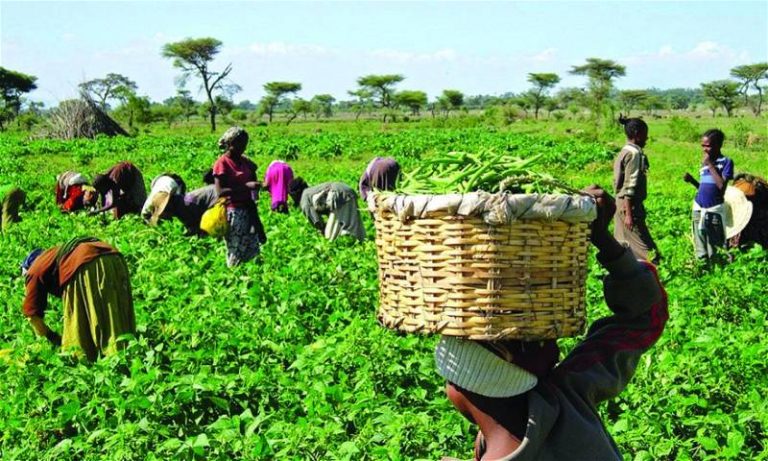Pineapple, a tropical plant with an edible fruit that provides wonderful health and nutritional benefits, has become highly demanded in Nigeria. Pineapple contains nutrients and beneficial compounds such as vitamin C, manganese, and enzymes to help aid digestion. Pineapple may help boost immunity, lower cancer risk and other chronic diseases, and improve recovery time after surgery.
The CEO of Davidorlah, Mr Segun Alabi, who recently launched a large pineapple farm in Nigeria, highlighted the vast potential of the pineapple farming value chain which, according to him, extends beyond food production to include biofuel, renewable energy, and even products like clothing and shoes.
Information gathered indicates that local supply is far less than demand for the produce, forcing the country to import significantly to meet demand. This means investing in its farming will be a profitable venture. A farmer posited that anyone looking to start a profitable farming business in the country should look no further than the direction of pineapple. According to him, it “is the current money maker”. This fact has made many farmers and would-be farmers in the country start looking in the direction of pineapple farming.
The following pieces of information are, therefore, provided to serve as a guide for whoever is interested in embarking on this particular aspect of farming.
1. Tropical climate
Pineapple is a crop that needs an equal amount of sunlight and rainfall, meaning it’s a crop for the tropical region in which West Africa falls. Pineapples like a warm environment to grow in, wanting somewhere sunny and with a temperature of around 80ºF. The plant does not enjoy the temperature dropping lower than 50ºF.
2. Can be grown indoors
Pineapple is a kind of ornamental crop that can be planted indoors around the house in a flower pot or any other suitable container. However, this requires artificial lighting to supplement natural light during the winter months. Justin Hancock, horticulturist with Costa Farms is quoted as saying “The trickiest part is giving your plant sufficient light.”
3. Patience
Growing pineapples requires a lot of patience and it can take years to go from planting to getting a fruit to harvest. It can take up to three years to finally get a ripe pineapple to harvest from the plant. It may seem for long periods that nothing is happening with the plant.
4. Planting materials
A pineapple production guide report highlights four seed materials of pineapple that can be planted.
i. Slips: These are basal suckers known and located at the base of the fruit. They produce fruit within fourteen to sixteen months after planting and are the preferred type of planting materials.
ii. Suckers: These are side shoots produced above ground level and when used, bear fruit within eighteen to twenty months after planting.
iii. Crowns: Crowns are situated at the apex of the fruit. This type of planting material is not commonly used by farmers, and even when used, it takes as long as twenty-four months or more after planting to produce fruits.
iv. Ratoon suckers: These are shoots produced from ground level and when used, will produce fruit in twelve to fourteen months after planting.
5. Nursery operations and planting
Pineapples are first planted in the nursery before being transferred to the farm field. They should be watered twice a week after planting in the dry season. Within six weeks of planting, small suckers begin to sprout on the nursery bed. These sprouts are removed (milked) and transferred to another bed, known as the nursery bed. “Baby suckers are transplanted into nursery beds 1m wide and of any convenient length 15cm apart. The rate of growth can be accelerated by incorporating organic manure into the nursery bed,” the report explains.
It includes that field establishment starts with marking out, getting the baseline at a convenient point, and the line which should be able to run across the field intercepting each other at a right angle. Spacing of at least 1m should be observed while planting on the field.
6. Mulching and Weed control
Mulching is essential to support the plants and control weeds because pineapples are slow-growing and do not cover the ground well enough to suppress weeds. Weeds compete with the pineapple plant not only for nutrients but also for water and sunlight. Weeds are said to be capable of causing considerable reduction in the growth of pineapple, resulting in poor crop yields. Weeds can be controlled manually by using cutlasses, hoes etc or with chemicals (herbicides) like diuron and ementryne at 2-3 litres /ha. Mulching reduces the cost of weeding and also the loss of nutrients through leaching.
7. Fertilizer Application
Application of fertilizer is important to enhance good yields in pineapple farming. According to experts, the types and quality of fertilizer applied should be related to the nutrient status of the soil. A blanket recommendation of 300-350kg of NPK 20:10:10 or NPK 15:15:15 may be applied in three split doses during the rainy season.
8. Harvesting
The signs that a pineapple is ripe and due for harvest are the colour, scent, and feel- it becomes a bit soft when pressed. While it is growing, the fruit will be green and have no scent, but this changes once it ripens. As it begins to ripen and get ready for harvest, it will start to turn golden. You may also begin to notice a sweet aroma and may also flop off to the side, no longer sitting upright in the centre of the leaves. Once all the signs point to ripeness, the pineapple should be harvested immediately by cutting the fruit from the stalk that attaches it to the plant.
Research has revealed that pineapples on average take up to 19-23 months from planting to maturity, ready to be harvested. According to the PRODUCTION GUIDE report, harvesting of pineapple fruits depends on whether the fruits are for domestic or export markets. It adds that fully ripe pineapple fruits are suitable for the local market while mature green fruits can be exported abroad.
9. Lifespan
One of the advantages that make pineapple farming very profitable is that it has a long lifespan. A pineapple orchard can continue to produce for up to eight years and more. Though each pineapple plant produces one fruit and dies after the fruit is harvested, new sections that developed during growing will continue to grow and produce fruits. These can be left to regrow or separated for replanting. Any further pineapples from such sections may take less time to grow. The crowns of any pineapples you harvest can also be planted to start the whole process again.
10. Challenges
The major challenges in the pineapple farming business are as follows:
–Inadequate resources: A lack of adequate resources such as capital, required land space, planting materials, water, tools and labour will spell doom.
–Lack of storage facilities: The absence of storage facilities and preservation for harvested pineapples, especially when there are no standby off-takers, will lead to a huge loss. So, adequate provision must be made for storage and preservation.
–Market: Pineapple is a perishable produce. Hence, an absence of a ready market is an invitation to regret. Fortunately, more companies are establishing pineapple product processing plants in the country. One needs to reach out to them and establish a business relationship before one’s pineapples reach maturity.
TO READ MORE NEWS UPDATES; CLICK @ https://www.voiceairmedia.com
NOTE: YOU can join our WhatsApp, Telegram for the news updates you need by sending your name & location to WhatsApp No. @ http://Wa.me/+2348111142174



